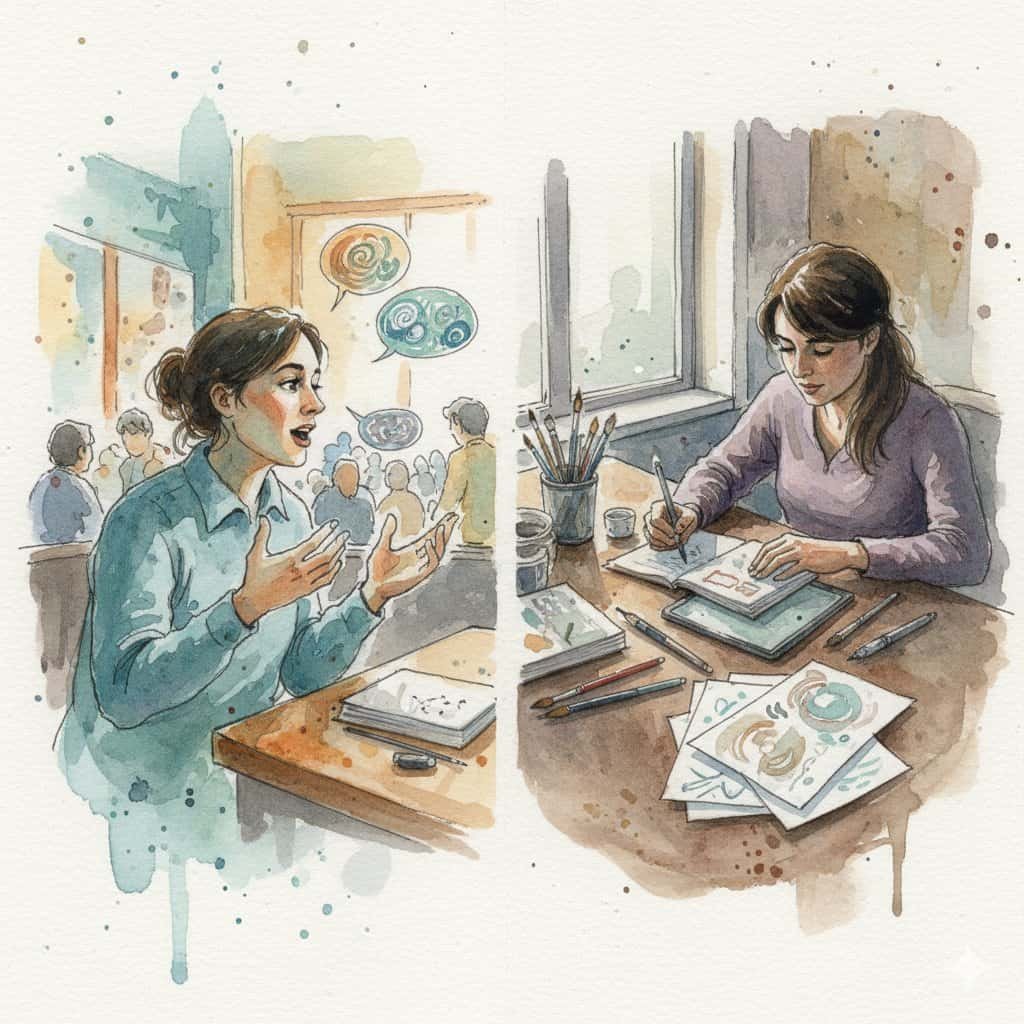I saw a video recently with a slogan I wrote down and stuck on my fridge: “Shut up. Suit up. Show up.”
It’s simple and direct. A reminder that sitting around complaining doesn’t help much, and that we need to be responsible, make an effort, and get on with work and life. It’s common sense, but it doesn’t hurt being reminded, especially for overthinkers or people caught up in negative situations and thoughts over a prolonged period.
Table of Contents

But here’s a question: How do you balance that pushing through with the need to talk honestly about what you’re going through? This blog exists because I believe authentic communication matters. Yet I also believe in showing up, functioning, and moving forward, or at least there comes a time to do so. You can do both, but finding the balance between them isn’t always straightforward.
How do you actually balance getting through your struggles with getting on with life?
When Talking Might Help and When It Might Not
Not all conversations about difficulty help in the same way. There’s a difference between:
Talking that moves you forward – Working through things with someone who actually listens, sharing in ways that bring you closer to others, and admitting struggles you’ve been dealing with alone. This kind of talking often brings relief, helps you see things more clearly, and reminds you that others face similar challenges.
Talking that keeps you stuck – Complaining about the same things over and over without trying to fix anything, using conversation to avoid taking action, and sharing in ways that wear people out instead of bringing you closer. This kind of talking can trap you in the problem instead of helping you move past it.

The tricky part? Sometimes you can’t tell which kind of talking you’re doing until afterward. Sometimes what starts as working through your feelings turns into going in circles and overthinking. Sometimes what feels like you’re just stuck in sadness is actually grief that needs more time than you’d like.
When has talking about a struggle helped you move through it?
The Situations Where Honesty Works
I’ve noticed that certain times naturally allow for real, honest conversation, while others require speaking less and doing more.
Here’s an example from my own experience:
In the work truck with my farming boss, we’re stuck together for the drive, so we have talked about his issues and mine equally. The sharing of real honest situations releases a little stress, puts us on the same page, reminds us of who’s going through what, and then we can continue working as a team, and communicate and support each other appropriately. Sometimes, if we know that someone is going through a tough patch, we might make allowances to adjust communication styles, demands, schedules, and other things to keep the team functioning and the work going smoothly.
Choosing to communicate in the truck like this works because it’s mutual, it ends when the drive ends, and happens alongside the work rather than instead of it.
In the field or greenhouse, this rarely happens. The work demands focus. There’s a productive team player attitude to maintain because getting on with work matters. This is true in many workplaces. It’s not bottling things up—it’s just knowing when and where to talk about things. Not every moment requires emotional support, even if it feels like it helps for the most part.

In my classroom, students sometimes open up about what they’re dealing with because the space feels safe and practicing speaking naturally leads to talking about life. When it happens genuinely, it makes our connection stronger and helps them learn better. When it turns into a therapy session, it’s probably gone too far. Of course, the role and qualifications of a language teacher are not to be a therapist (or priest, as I’ve been told).
This blog is specifically meant to be a place for honest conversation about challenges. People can engage when they’re ready, ignore it when they’re not, and share as much or as little as they want. I want to help others feel better by expressing themselves.
Where is a safe place that you can be honest about what you’re dealing with?
Cultural Differences in Expression
Different cultures handle struggle differently. Some encourage talking openly about problems; others think it’s better to stay strong and quiet. Some cultures see sharing your difficulties as weak; others think keeping everything to yourself cuts you off from people.
In Japan, where I’ve lived for twenty years, people usually don’t burden others with their problems – it’s seen as polite. In the UK, where I grew up, there’s a “keep calm and carry on” attitude that can make sharing your struggles feel like you’re being dramatic or self-centered.

Neither approach is all good or all bad. But when people have no safe place to talk about what they’re going through, the pressure builds up in ways that hurt them rather than make them stronger.
Did your family talk about problems openly, or was that something you just didn’t do?
Figuring Out When to Talk and When to Just Keep Going
Maybe the real skill isn’t choosing between talking and getting on with things—it’s knowing when each one actually helps.
Times when talking helps include:
- When you’re dealing with something by yourself that would be easier with support
- When you can’t figure something out on your own and need another viewpoint
- When you’re grieving and need someone to recognize what you’re going through
- When being alone is making your problems feel bigger than they are
- When keeping secrets or feeling embarrassed is eating away at you
Times when showing up matters more include:
- When you’re going in circles thinking about the same thing over and over
- When you need to do something rather than keep analyzing it
- When people are counting on you to do your job or be there
- When thinking about your problems is stopping you from taking necessary action
- When you’re talking to avoid dealing with what you actually need to do
The balance changes. What you might need shifts depending on where you are in getting through your difficulty. Sometimes you need to talk it through. Sometimes you need to shut up, suit up, and show up. Often you need both, just at different moments, or after a certain period of time.
How do you know when it’s time to talk or time to just keep moving forward?
Being Real AND Being Responsible
Here’s what I’ve learned so far: Making time for honest conversation about struggle doesn’t mean giving up on the need to keep going, show up, and grow. Both matter.
This blog encourages honest talk about challenges because I believe that matters. But I also believe (after a necessary amount of time) in showing up—cycling to work even when I don’t feel like it, teaching my classes whether I’m struggling or not, or farming because the work needs doing no matter how I’m feeling. (I use these as examples for all of us, too.)

The “shut up, suit up, show up” mentality doesn’t ignore pain. It’s an understanding that life keeps going and continues to require our effort, even when we’re dealing with difficulty or we’re ready or not. That’s why I put it on my fridge as a reminder. We can’t always wait until we feel ready or happy to keep functioning. Plus, sometimes it’s the functioning and participating that helps to get us through a situation, happy or not. Although we can’t necessarily consider this during hard times, such as loss, we can remember that there are people out there suffering too, some of them in maybe more challenging circumstances than ours.
But we also can’t only function. We often need spaces and times to be honest about what we’re dealing with. To admit when we’re struggling. To talk over things with people who can actually hear us. To acknowledge that keeping everything locked inside creates its own problems.
How do you balance keeping your life going with dealing with what you’re going through?
What’s Worked for You?
I’m asking because I don’t have this figured out myself. We all handle tough stuff differently, and it probably depends on how bad things are.
Some people need to talk everything through. Others cope by staying busy. Some need different approaches at different times. Your culture or personality might push you one way or the other.
Here’s what I want to know:
Do you need to talk things out, or does it help more to just keep moving? Has the way you handle things changed as you’ve gotten older or faced different situations?
Did you think you’d react one way to something hard, but then surprised yourself with how you actually dealt with it?
When you’ve been through rough times, what helped more—having someone to talk to, or having work and responsibilities to keep you going? Or did you need both?
What’s your honest experience with this balance?
Your Approach Might Help Someone Else
This blog is about real conversations, which means hearing how you’ve actually handled tough times—not how you think you’re supposed to handle them.
Maybe you need to talk a lot about your problems before you can deal with them. Perhaps you cope by staying busy and don’t want to think about things too much. Maybe you’ve figured out that different problems need different approaches. Perhaps you’re just now realizing how your family or culture shaped the way you deal with hard stuff.
All of that matters. The way you balance talking about things and just getting on with life might help someone else figure out what works for them. Being honest about what helped you and what didn’t could give someone else permission to try a different approach.

When and where do you feel safe to talk about problems? Where do you need to stay focused or produictive? Who can you rely on for personal conversations?
Share your thoughts below. I respond to every comment, and your stories often help others more than mine do.




